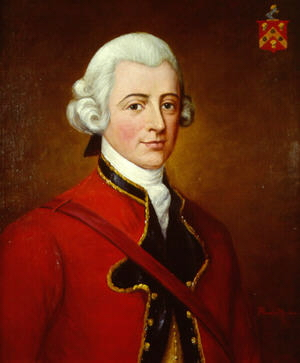Sir Frederick Eden, 2nd Baronet facts for kids
Sir Frederick Morton Eden, 2nd Baronet, of Maryland (born June 18, 1766 – died November 14, 1809) was an English writer. He was a pioneer in studying poverty and social issues.
Contents
Early Life and Family Background

Frederick Morton Eden was the oldest son of Sir Robert Eden, 1st Baronet, of Maryland. His mother was Caroline Calvert. She was the sister of the last Lord Baltimore. Frederick's father was the governor of Maryland. He was given the special title of a baronet in 1776. A baronet is a title of honor, like a knight, that can be passed down in a family.
Frederick became the 2nd Baronet when his father died in 1784. He studied at Christ Church, Oxford University. Later, he helped start the Globe Insurance Company. He even became its chairman. Frederick died suddenly in 1809 at the age of 43. He passed away at the office of the company he helped create.
Studying Poverty and Society
Frederick Eden is well-known for his work as a social investigator. His most famous book is The State of the Poor. It was published in three volumes in 1797. He explained why he decided to do this important research.
He saw that working families were struggling. Food, clothes, and fuel were very expensive in 1794 and 1795. This made him want to learn more about their lives. He wanted to help and was also curious. So, he looked into their living conditions in many parts of England.
Eden wanted his book to provide facts. These facts would help people decide what to do about poverty. He believed that many ideas about helping the poor were not based on enough real information. He wanted to show the small details that others had missed.
The full title of his book was very long. It described everything inside: The State of the Poor: or a history of the labouring classes in England, from the Conquest to the present period; in which are particularly considered, their domestic economy, with respect to diet, dress, fuel, and habitation; and the various plans which, from time to time, have been proposed and adopted for the relief of the poor: together with parochial reports relative to the administration of work-houses, and houses of industry; the state of the Friendly Societies, and other public institutions; in several agricultural, commercial and manufacturing, districts. With a large appendix; containing a comparative and chronological table of the prices of labour, of provisions, and of other commodities; an account of the poor in Scotland; and many original documents on subjects of national importance.
To gather information, Eden did some of the research himself. He also got details from church leaders. He even sent out a "faithful and intelligent person" with a special questionnaire. This questionnaire was similar to one used by Sir John Sinclair for his book about Scotland.
Impact and Lasting Importance
Many important thinkers praised Eden's work. John Ramsay McCulloch, a writer on economics, called Eden's book a "grand storehouse of information." He said it was essential for anyone studying the working classes in England.
Karl Marx, another famous thinker, said Eden was the only important follower of Adam Smith in the 1700s. However, Marx also criticized some of Eden's ideas. Marx felt that Eden sometimes supported harsh conditions for poor and vulnerable people. He pointed out that some factories used very young children. These children worked long hours, even at night, and did not get enough rest. Marx worried about the bad effects on children who worked in such conditions.
Francis Ysidro Edgeworth wrote about Eden in a famous dictionary. He believed Eden should be ranked with Arthur Young. Both were important thinkers after Adam Smith. They were good at using real-world facts to study economics.
Even a British Prime Minister, Anthony Eden, was related to Frederick. A recent book about Anthony Eden says he was influenced by Frederick's work. He kept a copy of The State of the Poor on his bookshelf throughout his life.
Family Life
Frederick Eden married Anne Smith on January 10, 1792. They had eight children:
- Marianne Eden (around 1793 – May 13, 1859)
- Sir Frederick Eden, 3rd Baronet (around 1794 – December 1814)
- Caroline Eden (around 1801 – November 10, 1854) who married Vice-Admiral Hyde Parker
- Sir William Eden, 4th/6th Bt.+1 (January 31, 1803 – October 21, 1873)
- Rt Reverend Robert Eden (September 2, 1804 – August 26, 1886)
- Lieutenant-General George Morton Eden (May 10, 1806 – November 1862)
- An unknown child (born 1806) who married Arthur Keogh
- Vice-Admiral Sir Charles Eden (July 3, 1808 – March 7, 1878)
See also
- Eden baronets
 | Aurelia Browder |
 | Nannie Helen Burroughs |
 | Michelle Alexander |

